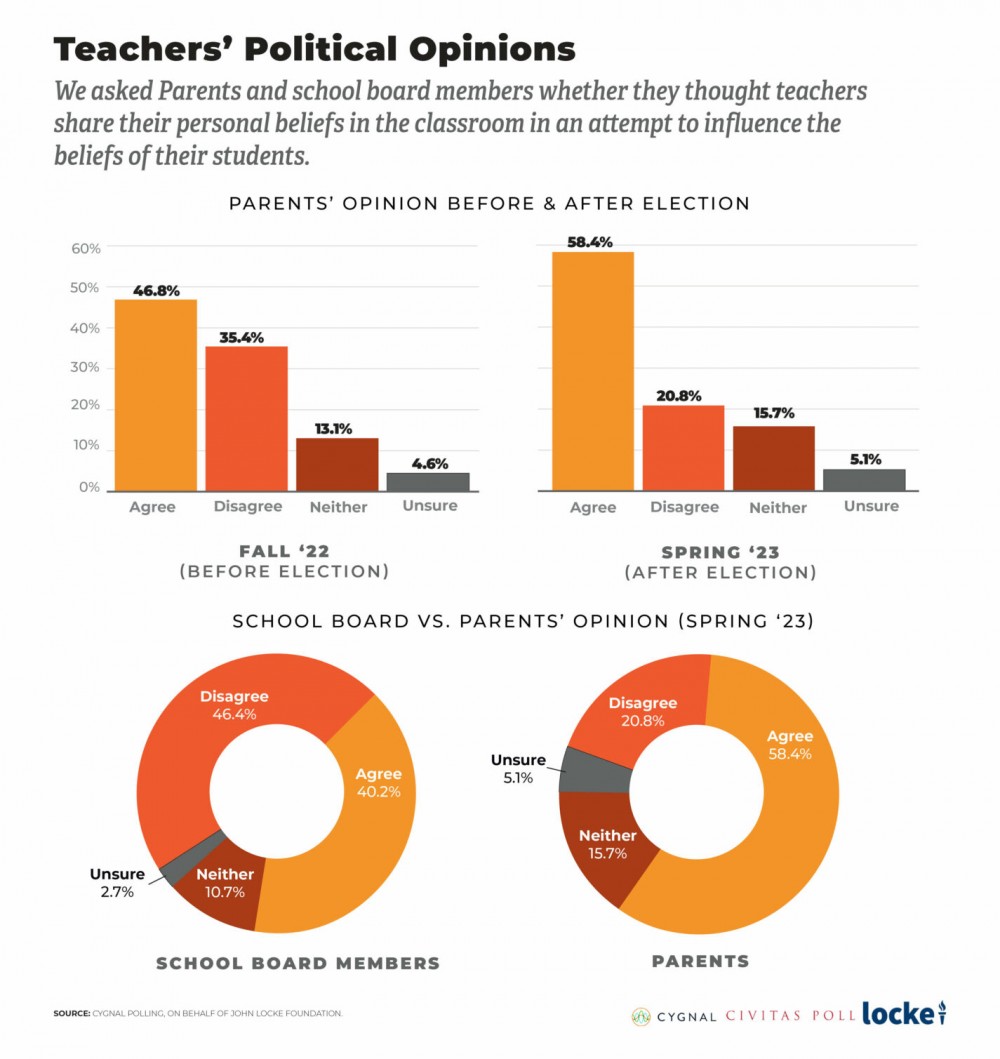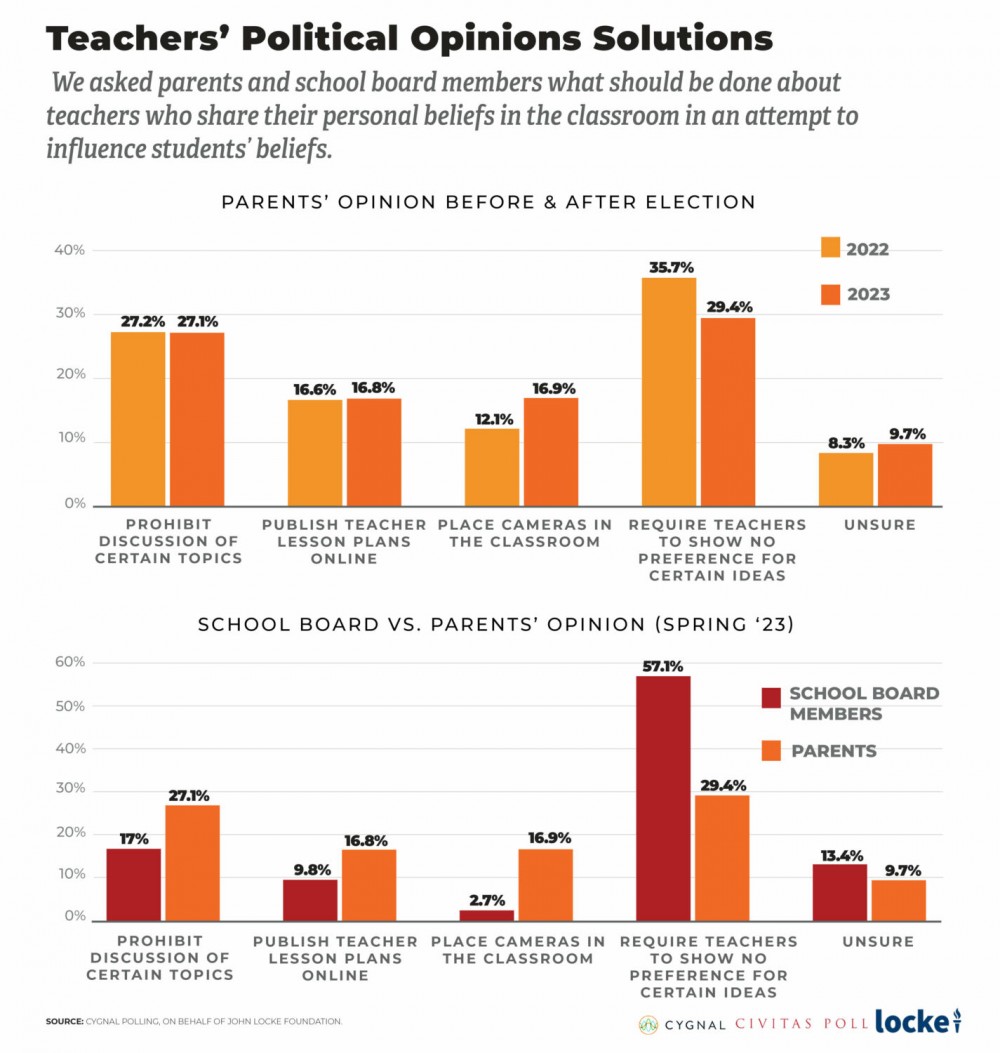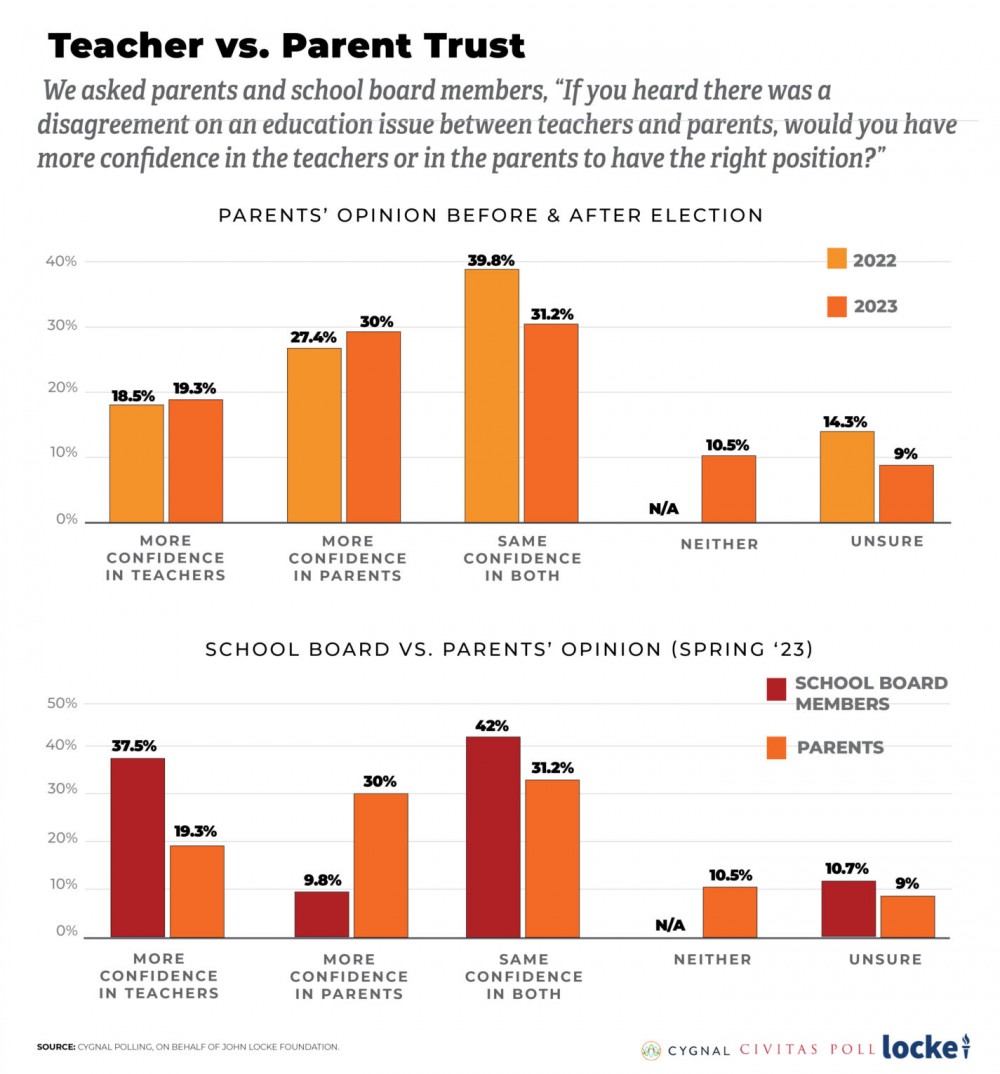Publisher's Note: This post appears here courtesy of the John Locke Foundation. The author of this post is Kaitlyn Shepherd.
- Most parents still think that education has become more political over the past five years, as do most school board members
- A majority of parents think that some teachers contribute to politicized classrooms by trying to sway students toward their personal views, but the plurality of school board members disagree
- Parents and school board members agree that any attempts to indoctrinate students should be addressed either by requiring teacher neutrality or by prohibiting discussion of certain topics, and in a dispute between teachers and a group of parents, school board members and parents were equally confident in the parents and teachers to take the right position
This brief is the second of a three-part series on education polling in North Carolina. Part 1 shared some of the findings of polls of school board members and parents. This part discusses results of the same polls concerning questions about teachers. Finally, Part 3 will share the findings of separate questions on governance and school funding.
Two polls recently commissioned by the John Locke Foundation revealed what parents and school board members think about teachers.
Locke's polls followed up on a poll conducted last fall to determine how parental sentiment has changed over time and whether the perspectives of school board members are out of touch with those of parents on key educational issues.
A previous article discussed how both groups viewed the direction of education in North Carolina, the governance of schools, and the discussion of controversial topics such as gender identity.
Now let's examine what the polls told us about how parents and school board members viewed the actions and attitudes of teachers. We asked both groups whether they thought some teachers try to influence students with their personal beliefs, what should be done to address any such attempts, and whether teachers or parents would take the right position in an educational dispute.
Have Classrooms Become More Political?
We asked parents and school board members whether they thought that classroom instruction had become more politicized over the past five years. Both groups agreed that education had become more political, not less.
North Carolina parents continued to think that their children's classrooms had become more political, but fewer parents seemed to think so than before.
Nearly 59% of parents who responded to the spring survey said that classroom instruction had become more political. Parental concern had dwindled somewhat from the fall, when nearly 72% of parents noted the politicization of schools.
Meanwhile, school board members overwhelmingly said that education had become more political. The spring 2023 survey revealed that 83% of school board members thought so, while less than 2% thought schools had become less political, and roughly one in 10 members thought things were about the same.

Do Some Teachers Contribute to Politicized Classrooms?
One way that teachers could contribute to making education more political is by presenting their personal beliefs to influence what students believe. Parents generally thought that some teachers do try to influence students' beliefs with their own views.
In 2022, a plurality of parents (47%) said that some teachers promote their personal beliefs in the classroom. Parents of all political persuasions generally agreed. Most Republican parents (54%) agreed, as did pluralities of Democrats (45%) and Independents (43%).
Over time, more parents have come to believe that some teachers try to influence students' beliefs. The spring 2023 poll showed that 58% of parents thought teachers shared their personal beliefs in the classroom in an attempt to influence their students' beliefs, an increase of nearly 12 percentage points. Republican (58%), Democratic (67%), and Independent (40%) parents concurred.
The plurality (46%) of school board members, however, disagreed that teachers shared their personal beliefs in the classroom in an attempt to influence their students' beliefs, while 40% agreed. A majority of Republican board members (56%) said teachers tried to influence students' beliefs, while most Democrats (70%) disagreed, and Independents were evenly split (43% agree and 43% disagree).

How Should Classroom Indoctrination Be Addressed?
Overall, parents and school board members agreed that the best ways to address classroom indoctrination were either requiring teachers to remain neutral when presenting information or prohibiting coverage of certain topics altogether.
Last fall, a plurality of parents (36%) said that schools should require teachers to show no preference for certain ideas, while 27% of parents thought that prohibiting any discussion of certain topics was the best course of action. Republican and Independent parents were more likely to favor keeping certain topics out of the classroom, as were parents without a college degree. College-educated and Democratic parents, on the other hand, generally favored requiring teacher neutrality.
In 2023, the plurality of parents (29%) still maintained that requiring teacher neutrality was the best way to address indoctrination, but support for that option had declined. Meanwhile, support for prohibiting any discussion of certain topics (27%) remained unchanged, while placing cameras in the classroom saw increased support (going from 12% up to 17%). A plurality of Independents favored pursuing academic transparency by posting teacher lesson plans online.
Support for teacher neutrality was even stronger among school board members. More than half of respondents (57%) favored requiring teachers to remain neutral, while only 17% preferred preventing teachers from covering certain topics. Male school board members and members without college degrees were more likely to favor outright prohibitions, while female and college-educated board members were more likely to favor teacher neutrality.

Who Would Take the Correct Position in a Dispute: Parents or Teachers?
Our polls also asked,
"If you heard there was a disagreement on an education issue between teachers and a group of parents, would you generally have more confidence in the teachers or in the parent group to have the right position on the issue?"
Pluralities of parents and school board members agreed that they would be equally confident in the parents and the teachers to be on the right side of the issue.
The fall survey revealed that a plurality of parents (40%) would feel equally confident in parents and teachers to take the right stance. Just over a quarter of parents (27%) expressed more confidence in the parents, while 19% felt more confident in the teachers.
Democratic and Independent parents were more likely to trust both groups, while Republican parents were more likely to express confidence in parents.
In the spring poll, a smaller plurality of parents (31%) said that they would feel equally confident in the parents and the teachers, about the same proportion (30%) trusted the parents to make the right decision, and confidence in teachers remained constant (19%). One in 10 didn't trust either group to have the right position.
A larger plurality of the school board members who responded to the poll (42%) said that they would have equal confidence in the parents and teachers to have the right view. School board members were more likely than parents (38% vs. 19%) to express confidence in the teachers, and they were much less likely than parents to trust the parent group (10% vs. 30%). Whereas nearly a third of parents said that they would have more confidence in the parent group, fewer than one in 10 school board members who took the poll said that the parents would be right in an educational dispute with teachers. Democratic and Independent school board members were more likely to trust teachers over parents, while Republican members were more likely to trust both the parents and teachers.
 Summary
Summary
Locke's two new polls revealed several interesting data points about how parents and school board members viewed the behaviors and perspectives of teachers, including:

- Most parents and school board members agreed that classrooms had recently become more political. Regardless of party affiliation, parents generally thought that some teachers contributed to this problem by promoting their personal beliefs to influence what students believe. A plurality of school board members disagreed but were split by political persuasion.
- Parents and school board members agreed that any indoctrination would best be addressed either by requiring teacher neutrality or by prohibiting some discussions. The majority of school board members preferred teacher neutrality.
- Parents and school board members were generally equally confident in parents and teachers to take the right position when there was a disagreement over an educational issue. Otherwise, school board members tended to trust teachers in a disagreement, and parents tended to take the side of the parent group.
poll#175




